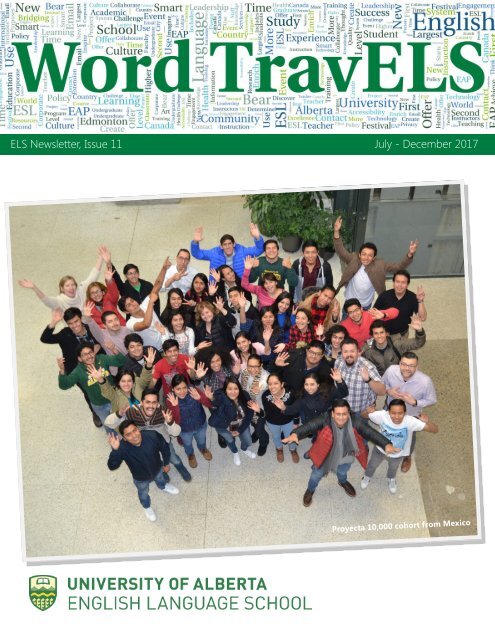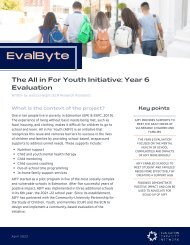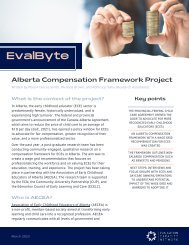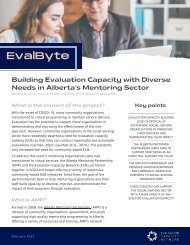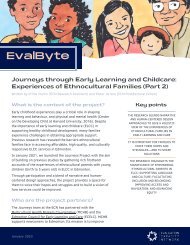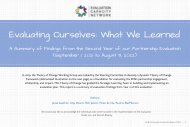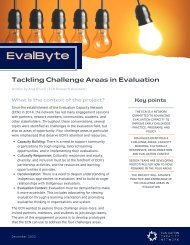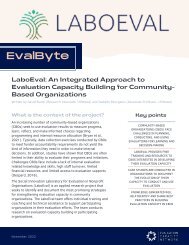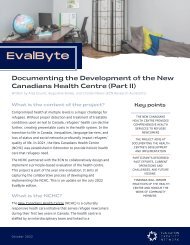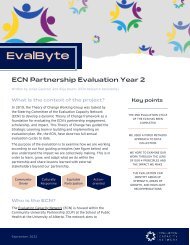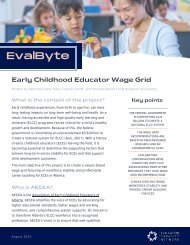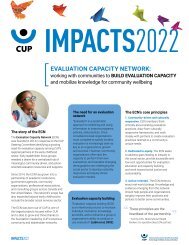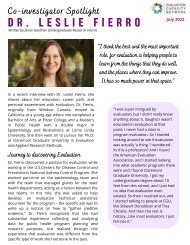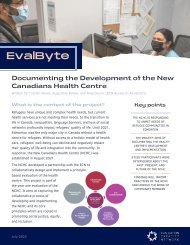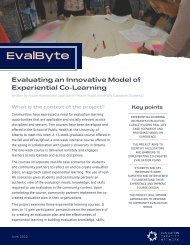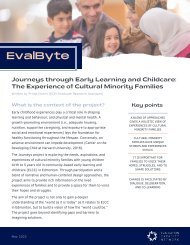Word TravELS
Current issue
Current issue
Create successful ePaper yourself
Turn your PDF publications into a flip-book with our unique Google optimized e-Paper software.
ELS Newsletter, Issue 11<br />
July - December 2017<br />
Proyecta 10,000 cohort from Mexico<br />
W o r d T r a v E L S |
English Language School<br />
Executive Director’s Message<br />
February 2018<br />
Dear readers:<br />
Like many of you, I view each New Year as a<br />
“fresh start,” a time for new energy to focus on<br />
the opportunities and challenges that the New<br />
Year promises.<br />
This first issue of <strong>Word</strong> <strong>TravELS</strong> in 2018 provides a<br />
flashback of the many exciting and inspiring<br />
times at ELS, thanks to the work of so many<br />
talented and brilliant students, partners, and<br />
faculty members. You will discover stories,<br />
photos, and adventures from the latter part of<br />
2017 in this issue, which I sincerely hope you will<br />
enjoy.<br />
Looking forward to another productive year<br />
ahead. All the best for a peaceful and joyful 2018,<br />
everyone!<br />
CONTENTS<br />
3 Iron Man Amongst Us - A student’s story<br />
4 “Yes! We can.” - How ELS drove the food<br />
drive home<br />
6 My Canada Storytelling Project - ELS students<br />
share their Canadian stories<br />
8 Two APPEMI Cohorts - Professors participate<br />
in advanced professional training at ELS<br />
10 ELS at ATELS - EAP instructors share their<br />
research and enthusiasm with peers<br />
12 A Mosaic of ELS Students, Staff &<br />
Friends<br />
18 Teaching...Volunteering… - An instructor’s<br />
story about volunteering<br />
21 4 Days in Niigata - ELS staff members visit<br />
partner institute in Japan<br />
24 Sketches of Canada from a Gifu Per-<br />
spective - ELCS students share impressions<br />
of Canada<br />
Mimi Hui<br />
Executive Director<br />
English Language School<br />
26 A Mosaic of ELS Short Term Programs<br />
32 A Note from the Editor<br />
W o r d T r a v E L S | 2
ELS Student’s Story<br />
Iron Man Amongst Us<br />
I<br />
am Iron Man.”<br />
If you have<br />
seen the 2008<br />
movie “Iron<br />
Man,” you may<br />
remember that<br />
that was Tony<br />
Stark’s (aka Iron<br />
Man’s) line at the end of the movie.<br />
As things turn out, we also have an Iron Man<br />
amongst us in ELS. He does not wear an exoskeleton<br />
and will not be flying about on campus or engaging<br />
in aero-combat.<br />
And he probably won’t introduce himself as Iron<br />
Man. Instead, he’ll probably greet you with a smile,<br />
a handshake, and introduce<br />
himself as Tom.<br />
Tom (Zhiwen) Gao started his<br />
studies in the Faculty of Arts<br />
at UAlberta in the Bridging<br />
Program in September 2016.<br />
As of August 2017, he has<br />
participated in marathons,<br />
triathlons, and of course,<br />
Ironmans. Prior to his life as a<br />
UAlberta student, Tom has<br />
already established a rather<br />
impressive athletic track record<br />
in his home country, China.<br />
“It started 4 years ago,” Tom<br />
explains. “I was not in shape<br />
and started to go to [a] gym.<br />
I met a sporty guy there. He<br />
invited me to join the Beijing<br />
International Triathlon.”<br />
A year after Tom’s encounter<br />
with “sporty guy at the gym,” he took part in his<br />
first Beijing International Triathlon, and came 2nd<br />
in his age group (18 - 24).<br />
“I got hooked,” offers Tom with a grin.<br />
Another goal reached: Tom and Priscila<br />
(EAP Instructor) at the finish line of the<br />
Edmonton Marathon, August 2017<br />
Upon starting his UAlberta academic career, Tom joined<br />
the Triathlon Club on campus as the only Chinese student<br />
in the club.<br />
“It’s important to engage [myself] in this group (the Triathlon<br />
Club). There are people with the same interest.<br />
By communicating with people, I become better in<br />
communication.<br />
“In training, it is important to focus on balance. This<br />
meant working on both strengths and weaknesses.”<br />
Tom adds, “My weakness (in triathlon) is swimming. I<br />
need to work on that…Balance is important. It’s life.”<br />
Tom may not have been in Canada for long, but he has<br />
already participated in a number of races. “My first race<br />
was a half marathon in Jasper,” he recalls. That was followed<br />
by a half marathon in Edmonton, a Half Ironman<br />
in Calgary, an Ironman in<br />
Whistler, and a full marathon<br />
in Edmonton this August.<br />
When asked if he has any future<br />
plans, “My dream is to do<br />
the [Canadian] Death Race,”<br />
answers Tom, again with a<br />
grin. (Note from writer: If you<br />
have not heard of it, it is worth<br />
looking up what the “Canadian<br />
Death Race” is.)<br />
As for his academic future at<br />
UAlberta, Tom is considering<br />
expanding his studies into<br />
Physical Education as well.<br />
For someone who started<br />
training because he was “not in<br />
shape” to become someone<br />
who now calls triathlon a<br />
“lifestyle,” Tom has literally<br />
come a very long way. Compared<br />
to the path ahead, however,<br />
we are probably looking at just the first steps of<br />
something exciting to come.<br />
All the best, Tom!<br />
W o r d T r a v E L S | 3
ELS Events<br />
“Yes! We can.”<br />
T<br />
he 3rd Annual ELS Food Drive was a great success.<br />
Over a 4-week period, students and staff<br />
surpassed the goal of collecting 1,500 food and<br />
household items. According to the volunteer at The<br />
University of Alberta Campus Food Bank who<br />
weighed all items, the total weight came to 1,160 lbs<br />
(526 kg)!<br />
The drive kicked off with an announcement to all classes<br />
via a video from Barbara, the main organizer and<br />
coordinator of the drive. This was followed up via our<br />
weekly announcement “Simon Says” by the cutest<br />
bear on campus, Simon. (OK. GUBA is the coolest. But<br />
the cutest? That has to be Simon.)<br />
During each week of the drive, students<br />
and staff would bring in items according<br />
to the “theme” of week: canned<br />
food, dry goods, personal hygiene<br />
items, etc. The themes were coordinated<br />
with the Campus Food Bank according<br />
to the items most needed.<br />
Each class was also asked to compete<br />
with the other classes in coming up<br />
with the best team name. Jayne’s EAP<br />
140 came up with the winning name,<br />
“Helping Hearts.” Other teams names<br />
included “Food for Free,” Empty &<br />
Filled,” and “The Crazy Canuck Crew.”<br />
Barbara’s class, Team “Eaters Without<br />
Borders” came in top as the class that made the most<br />
donations.<br />
Then came delivery<br />
day. How<br />
do you deliver<br />
over 1,500 items<br />
from the downtown<br />
campus to<br />
North Campus?<br />
We could have<br />
asked our student<br />
volunteers<br />
and staff to<br />
each take a box<br />
and ride the LRT<br />
across the<br />
North Saskatchewan<br />
River. As<br />
interesting a<br />
spectacle that<br />
could have been… (Come on! A food convoy on an<br />
LRT train? How cool is that!)<br />
The UAlberta Vehicle Pool generously lent us a van to<br />
deliver the items from our office in Enterprise Square<br />
to the Campus Food Bank, located in the Students’<br />
Union Building (SUB) on North Campus.<br />
W o r d T r a v E L S | 4
Mark unloaded one box, the volunteer arrived<br />
to greet him, happily thanked him for<br />
the contribution and said, “that’s a lot of<br />
food,” and was about to return to his office<br />
when Mark showed him the contents of the<br />
cargo space…<br />
Surprise!<br />
Thanks to all ELS students & staff for their<br />
enthusiasm. (We are proud of you!) Thanks<br />
again to the UAlberta Vehicle Pool for their<br />
kind support. And a very special thanks to<br />
Barbara for driving the spirit of the food drive<br />
home!<br />
In fact, we couldn’t have been<br />
luckier that we had the van that<br />
day: the items filled its entire<br />
cargo space, only leaving room<br />
for Barbara and Mark (ELS office<br />
staff member and designated<br />
driver of the hour) to make the<br />
delivery.<br />
What unfolded next was in itself<br />
an interesting side story worth<br />
sharing.<br />
Upon arriving at SUB, Mark<br />
parked the van by the loading<br />
dock and texted the Food Bank Campus volunteer. As<br />
Indeed, we can. And so we did.<br />
Digital content: Visit the album 3rd Annual<br />
ELS Food Drive on our Facebook page for<br />
more photos of our food drive.<br />
W o r d T r a v E L S | 5
ELS Projects<br />
My Canada Storytelling Project<br />
I<br />
t was the right place; it was the right time, with the<br />
right participants and the right audience.<br />
The Canada 150 celebrations were in full swing.<br />
“Storytelling” was both the catalyst and itself the activity<br />
in a climate for all Canadians, new and old, to<br />
share their “Canada Story.” The ELS “My Canada Storytelling<br />
Project” was the perfect project for the students:<br />
the background of each student—of varied origins,<br />
culture, customs and languages—are themselves<br />
rich and colourful stories, stories that would add to<br />
the larger narrative of Canada 150.<br />
Zuzana Buchanan, EAP instructor and Student Engagement<br />
Centre coordinator (and student activity<br />
extraordinaire) offers, “a variety of storytelling projects<br />
have been launched, for example, by CBC<br />
(What’s your Story) and EPL (Share your Story). Our<br />
work thus aligns with wider interest in the use of multimedia<br />
storytelling to give more people an opportunity<br />
to relate their experiences of community and<br />
culture in Canada.”<br />
With guidance from Zuzana and other instructors,<br />
students would use words, images, and music to create<br />
their narratives. Amongst the various objectives of<br />
the project, “My Canada” was meant to “motivate students<br />
to create and share their work in English,” and<br />
“develop practical skills and language confidence.”<br />
“[This] aligns well with the aims of the [English<br />
Laguage School],” Zuzana continues. “It enables students<br />
to engage with new technologies, to learn practical<br />
skills, to understand and share their experiences<br />
of the [school] and of Canada, and to develop their<br />
English language skills in a memorable and productive<br />
manner.”<br />
After weeks of learning and creating, the students<br />
came up with 12 videos, 15 recordings, 4 presentations,<br />
1 song, and many pictures. We featured a number<br />
of these projects at the ELS Canada Day 150 Student<br />
Showcase (held on July 19, 2017).<br />
While each story was unique, there were common<br />
themes in them: discovery, travel, adventure, challenges,<br />
growth, hope, and new beginnings.<br />
W o r d T r a v E L S | 6<br />
Perhaps more so to adding to the larger narrative of<br />
Canada 150, “My Canada” became the opportunity for<br />
students to not affirm but reaffirm their being in Canada:<br />
their decision on choosing to study here for<br />
some, their reason for making Canada their new<br />
home for others.
Because the majority of the projects were produced in<br />
digital media, if you are reading a printed copy of this<br />
newsletter, please view the projects here via a digital<br />
copy of <strong>Word</strong> <strong>TravELS</strong>, available on the English Language<br />
School web site (www.uab.ca/ELS) under<br />
“About Us.”<br />
To all students who participated in the “My Canada<br />
Storytelling Project,” we thank you for sharing your<br />
stories. And whether you are continuing your stories<br />
within Canada or beyond, we wish you all the best<br />
Questions as Guidelines<br />
All students were given questions as guidelines to<br />
help them organize their stories.<br />
One of the questions was: “What is the most interesting<br />
place you have visited in Canada?” Many students<br />
responded, “Niagara Falls” and “Banff.” One responded<br />
“Drumheller.” Another “Vancouver.” However, we<br />
did a double take when we read “LRT station” in one<br />
of the responses. The student explains,<br />
…it was the most interesting place<br />
which I have visited in Edmonton because<br />
I have never seen before metro<br />
or tube or subway! I am looking forward<br />
to learning about it as much as<br />
it possible. Because we can use such<br />
as station to construct in my city…<br />
We have the same climate and<br />
ground.<br />
We may not have a perfect transit system, but we have<br />
one.<br />
Here are the other questions and answers our students<br />
provided.<br />
Q: What is something that surprised you about Canada?<br />
People greeting people they don’t know<br />
Public transport<br />
The atmosphere is very peaceful, and people<br />
are very kind.<br />
Since many…people [of different ethnicity] live<br />
together, nobody thinks I am not a Canadian until<br />
[I start] talking, and it is very comfortable for me.<br />
This is [very] different…in my country.<br />
I was surprised by the diverse educational system<br />
and diverse values of Canada...I think Canada<br />
has a better education system (than that of my<br />
home country) that respects individual decisions<br />
and allows individuals to make various efforts for<br />
their own lives.<br />
Q: How have you changed since you came to Canada.<br />
I gained a lot of skills and experiences. I have<br />
improved my English and spoke with better fluency.<br />
Moreover, I have a lot of friends from all over<br />
the world.<br />
Since I came to Canada, I have been able to<br />
enjoy… and design a more diverse and interesting<br />
[life for myself].<br />
I do not care [about my appearance as much]<br />
compared to before.<br />
I changed my driving mentality—<br />
from racing to comity and cooperation.<br />
I have lost 14 kilos of my weight since I arrived<br />
in Edmonton…[I am] eating more vegetables and<br />
less meat…I used to eat only meat.<br />
Q: What advice would you give to other students who<br />
have just arrived in Canada?<br />
Get yourself involved in helping people.<br />
Do not miss the chance to continue your education.<br />
Be active and do not [be] afraid to speak English.<br />
Learn...English by [connecting] with the community.<br />
Set goals.<br />
Ask questions.<br />
W o r d T r a v E L S | 7
ELS Programs<br />
Two APPEMI Cohorts<br />
L<br />
aughter is not at all a bad beginning for a friendship,<br />
and it is far the best ending for one.”<br />
When asked to reflect upon the APPEMI groups in the<br />
latter half of 2017, Dr. Pamela Young responds with<br />
the quote above by Oscar Wilde. “The CSC group<br />
laughed together from their first meeting to their<br />
graduation.”<br />
The Advanced Professional Program in English-<br />
Medium Instruction (APPEMI) is headed by Pam, the<br />
Academic Team Lead for APPEMI. Pam is the face,<br />
voice, mastermind, and trained dart-throwing ninja of<br />
APPEMI. (More details on the ninja bit to follow.)<br />
Between July and December of 2017, two cohorts with<br />
vastly different backgrounds and characteristics participated<br />
in APPEMI: the China Scholarship Council<br />
(CSC) cohort from China and the Universidad Tecnológica<br />
(UTEC) cohort from Uruguay.<br />
The CSC cohort included professors<br />
from a wide range of research areas—from<br />
Thermal Engineering to<br />
Comparative Literature; from Clinical<br />
Acupuncture to Information Management<br />
and Information Technology;<br />
from Teaching of Chinese as a<br />
Foreign Language to English Education;<br />
from Aquatic Animal Nutrition<br />
and Physiology to Accounting, just<br />
to name a few.<br />
So what do you get when you<br />
put brilliant yet diverse minds<br />
into the same room? As it<br />
turns out: a lot of laughter.<br />
At least that was the case for<br />
the CSC cohort.<br />
Pam recalls, “When they introduced<br />
themselves to each<br />
other…during their program<br />
orientation, one of the young<br />
men, whose name was Rui,<br />
said that ‘Rui’ meant ‘wisdom’<br />
in Mandarin. Later in the introductions,<br />
a woman said<br />
that her name was Rui Rui,<br />
then added that this showed<br />
she was twice as wise as<br />
‘Single Ray.’ Everyone<br />
laughed, and the nickname<br />
‘Single Ray’ stuck, a gentle<br />
poke at the young man’s ‘less<br />
wise,’ as well as his unmarried,<br />
status.”<br />
“When I arrived to teach a<br />
class with this group, I could<br />
often hear them talking and<br />
laughing from a long way<br />
down the hall. During presentations<br />
by their colleagues,<br />
laughter was also common -<br />
not in a mean way, but in the<br />
spirit of enjoying each other’s company.”<br />
“Another characteristic of this group was their cohesion<br />
and support of each other,” Pam continues. “They<br />
helped each other out with language challenges, and<br />
gave helpful feedback to each other’s work.”<br />
The APPEMI classes for the CSC cohort were all delivered<br />
on campus at UAlberta. The participants had the<br />
time and opportunity to explore both the university<br />
and the city. In fact, one of the professors, a professor<br />
of musicology and master qin player—a qin is a traditional<br />
Chinese string instrument—had the opportunity<br />
W o r d T r a v E L S | 8
to guest perform with the Edmonton Chinese<br />
Philharmonic Orchestra at their concert and to<br />
also perform in a well-received solo lunch-hour<br />
concert at the Faculty of Extension.<br />
In contrast, the APPEMI classes for the UTEC<br />
cohort were delivered in a very different manner:<br />
online and in person. The cohort consisted<br />
of six “English language teachers in the same<br />
department…They too had a cohesive spirit,”<br />
Pam notes. The cohort may be from the same<br />
department, but they were not all on the same<br />
continent.<br />
“I taught them an instructional design course<br />
online,” explains Pam, “and they beamed into<br />
my office from their homes throughout Uruguay,<br />
as well as the U.K. and the U.S., where two<br />
of them were involved in other professional development<br />
activities.<br />
the teaching practices in nine classes, talked to the<br />
instructors of those classes about their experience<br />
teaching in English, and to undergraduate and graduate<br />
students about their experiences of learning content<br />
in English.”<br />
And yes, Wakayama is where Pam received ninja dartthrowing<br />
and camouflage training.<br />
In complete secrecy, of course.<br />
The dynamism and agility in how APPEMI can be delivered<br />
is unique amongst programs at the English<br />
Language School. Who knows, perhaps “APPEMI for<br />
Ninjas” might not be that far-fetched of an idea after<br />
all.<br />
“When I travelled to Montevideo to teach the lesson<br />
planning course, four of them learned with me faceto-face,<br />
while the other two participated via video. It<br />
was great to get to know them after our virtual introduction<br />
to each other, and they even took care of me<br />
when I didn’t feel well during the teaching gig.”<br />
APPEMI in Uruguay was not Pam’s first overseas “gig.”<br />
She has previously delivered similar courses in China,<br />
and was invited to a one-week observation visit at<br />
Wakayama University, Japan. Pam adds, “I observed<br />
W o r d T r a v E L S | 9
ELS Instructors<br />
ELS at ATESL<br />
W<br />
hen you see our English Language School (ELS)<br />
instructors in front of a room talking to a<br />
group of people, it is usually because they are teaching<br />
students whose aim is to learn English and hone<br />
their Academic English skills.<br />
Now picture this: instead of students, our instructors<br />
are now standing in front of a room full of their<br />
peers—instructors and researchers from other institutions—and<br />
are about to deliver a presentation.<br />
Pressure? Perhaps. But pressure can also be accompanied<br />
by pleasure; pleasure gained from the satisfaction<br />
of delivering great presentations.<br />
Such was the case at the ATESL 2017 Conference —<br />
Expanding Possibilities: Diversity and Innovation,<br />
where a team of ELS instructors and researchers had<br />
the opportunity to present their work and share their<br />
views with their peers. “Team ELS” included:<br />
Dr. Yvonne Breckinridge - EAP Instructor, Extension<br />
Dr. Jennifer Foote - Assistant Professor, Extension<br />
Dr. Martin Guardado - Associate Professor and Academic<br />
Director, Extension<br />
Justine Light - EAP Instructor, Extension, and Adjunct<br />
Professor, TESL Program, Faculty of Education<br />
Nayar Lopez - EAP Instructor, Extension<br />
Anne Merritt - Curriculum Developer and Instructor,<br />
Extension<br />
“The ATESL conference is a great opportunity to share<br />
the work that ELS is doing with colleagues from<br />
around the province and beyond,” comments Justine.<br />
“Our sessions ranged on topics from task-based language<br />
teaching, teaching intercultural communicative<br />
competence to pronunciation and graduate EAP. All<br />
[ELS] presentations were very well attended. We are<br />
doing really good work here and it is a positive thing<br />
to let others<br />
know about it.”<br />
Justine, along<br />
with Martin and<br />
Nayar, presented<br />
“Task-based<br />
language<br />
teaching: A<br />
sampler of classroom ready task CLB 7-9” at the conference.<br />
Commenting on<br />
a different session,<br />
Anne offers,<br />
“Martin<br />
and I gave a<br />
presentation<br />
titled ‘Poutine<br />
or Pipelines?<br />
Choosing Canadian Cultural Content for Visiting Students.’<br />
Our goal was to explain the design process of<br />
our Introduction to Canadian Culture Course, which<br />
has been delivered to several groups of short-term<br />
visiting students.”<br />
W o r d T r a v E L S | 10
Each year, in addition to long-term degree-seeking<br />
full-time students, ELS receives hundreds of students<br />
who participate in the “English Language and Cultural<br />
Seminar” (ELCS), a short-term full-time intensive language<br />
training and cultural experience program.<br />
Anne continues, “The goal for the course was to give<br />
students the information and tools they need to optimize<br />
their time in Canada, not simply to teach them<br />
facts about Canada that they can learn in a guidebook.<br />
To build this course, we looked at students’ situations<br />
and itineraries in Canada and spoke to our<br />
own teachers and programming and homestay coordinators<br />
to identify relevant gaps of knowledge that<br />
could impede engagement or cause confusion or misunderstanding<br />
for our students.<br />
“In the presentation, we presented one lesson from<br />
the course, Canadian English, which addressed a common<br />
student question (‘Do you use British or American<br />
English?’) and discussed two significant features<br />
of Canadian English, ‘sorry’ and ‘eh.’”<br />
The fact that the presentations were received positively<br />
underscores that Canadian cultural content is on<br />
the minds of teachers who want to give their students<br />
lessons contextualised to their experiences in Canada.<br />
The weeks leading up to the conference was a very<br />
busy period for all our presenters, who had to split<br />
their days between<br />
teaching/researching<br />
and preparing for the<br />
conference.<br />
Was all the hard work<br />
worth it? Justine’s<br />
comments seem to<br />
suggest so.<br />
“I particularly enjoyed<br />
presenting with my<br />
teaching colleagues,<br />
Nayar and Yvonne,<br />
and the conference<br />
gave us a chance to<br />
reflect on our work and accomplishments. The nicest<br />
feedback we got was when a university professor told<br />
us we were so enthusiastic about our class it made<br />
her wish she was teaching at ELS, too. Thanks to ELS<br />
for supporting our travel and professional development.”<br />
Unbeknownst to Justine at the time, upon spotting<br />
our Tweets during the conference, one of Yvonne’s<br />
former students promptly responded, “Taking this<br />
prep course (EAP 550*) is much more relevant and<br />
effective than asking candidates to take the GRE.”<br />
Great efforts and well-received presentations. Good<br />
job, Team ELS!<br />
The ATESL 2017 Conference took place on October 20<br />
and 21 in Calgary.<br />
*EAP 550 is an intensive course designed to build the<br />
language skills necessary for students to be effective,<br />
independent participants in graduate studies at an English<br />
language university. Course content focuses on developing<br />
the advanced reading, writing and speaking<br />
skills required in graduate school. Coursework assignments<br />
reflect the demands of graduate level study.<br />
W o r d T r a v E L S | 11
ELS Students, Staff & Friends - A Mosaic<br />
W o r d T r a v E L S | 12
W o r d T r a v E L S | 13
ELS Students, Staff & Friends - A Mosaic<br />
W o r d T r a v E L S | 14
W o r d T r a v E L S | 15
ELS Students, Staff & Friends - A Mosaic<br />
W o r d T r a v E L S | 16
W o r d T r a v E L S | 17
ELS - No Capes Necessary<br />
Teaching...Volunteering...<br />
A<br />
t the risk of making one too many references to<br />
movies in this issue (see “Iron Man Amongst<br />
Us”)—spoilers alert if you haven’t seen “The Incredibles”<br />
(circa 2004)—you may remember from an early<br />
scene in the movie, where the narrator says, “...[the<br />
superheroes] are living among us. Average citizens.<br />
Average heroes. Quietly and anonymously continuing<br />
to make the world a better place.” In the movie, this<br />
happened after the “supers” were accused of stepping<br />
out of line and actually causing more bad than good,<br />
and were forced to stop hero work. (Watch the movie<br />
for the full story. <strong>Word</strong> has it that the sequel is coming<br />
out this summer!)<br />
In the ELS world, we have supers who also quietly and<br />
anonymously continue to make our world a better<br />
place. They, however, are anything but average.<br />
In this, our new column called “No Capes Required,”<br />
we will feature our heroes as our way to acknowledge<br />
the important contribution and the difference they<br />
make in both the English Language School and our<br />
students’ lives. (Yes. “No Capes” is another reference<br />
from “The Incredibles.”) Our first capeless crusader<br />
we’d like to feature is Barbara Lavallee.<br />
Barbara is a long-time English for Academic Purposes<br />
(EAP) instructor of the English Language School. While<br />
most of us know her as an “instructor,” Barbara is also<br />
an avid volunteer. Her energy and enthusiasm as a<br />
volunteer in the local community easily matches her<br />
W o r d T r a v E L S | 18
work at ELS. She also has creative ways to<br />
weave the “learning” and “volunteering” processes<br />
together within the setting of an EAP<br />
class.<br />
same. And the students really seem to genuinely appreciate<br />
the experience.<br />
One of the students commented about how much she<br />
Barbara would, as part of the students’ studies<br />
in EAP, assign them to visit, learn about, that others can see that not only is volunteering fun,<br />
enjoyed volunteering at Hope Mission, and hoped<br />
and become familiar with areas and events in but it can also help make changes.<br />
Edmonton in order to “establish and sustain<br />
opportunities to help them integrate into the “The students were very keen.” Barbara explains in a<br />
local and university communities.” This, in report. “They were diligent, showed up, worked hard,<br />
fact, is one of the priorities of the English Language<br />
School Strategic Plan: Inclusive En-<br />
interacted with staff and peers in a positive way and<br />
were well received by the institutions involved.”<br />
gagement.<br />
With Barbara’s help, ELS students got to volunteer at<br />
Outside the EAP classroom, not only does<br />
different organizations in Edmonton during the November<br />
- December term: making sandwiches at<br />
Barbara make time to volunteer and engage<br />
with the local community, she also helps facilitate<br />
opportunities for her students to do<br />
Hope Mission, preparing Christmas hampers at<br />
the<br />
W o r d T r a v E L S | 19
ELS - No Capes Necessary<br />
Edmonton’s the veterans felt important. The activity was very well<br />
Food Bank, received.”<br />
and wrapping<br />
Christ-<br />
The most impactful project that Barbara took on this<br />
term, however, was the 3rd Annual Food Drive. While<br />
mas gifts for<br />
this endeavour involved many students and staff,<br />
the Christmas<br />
Bureau<br />
there is no argument that Barbara’s efforts at the<br />
helm really drove the food drive home. You can find<br />
Charity at<br />
out more about the food drive in our article, “Yes! We<br />
Bonnie Doon<br />
can.”<br />
Mall.<br />
Hats off to Barbara for making our world a better<br />
Barbara also<br />
place.<br />
helped bring<br />
the community<br />
to ELS.<br />
We will be featuring more ELS heroes in “No Capes<br />
Necessary.” So stay tuned! Of course, without knowing,<br />
you might very well be sitting next to a super, or<br />
For the weekly Conversation Club that preceded Remembrance<br />
Day, she invited veterans from different<br />
taking classes from one, or having lunch everyday<br />
legions as special guests to talk to students. “The students<br />
and veterans engaged in meaningful conversa-<br />
Or maybe you are one.<br />
with one.<br />
tions about the significance of Remembrance Day,”<br />
And if you are, and you’re wondering, here’s what<br />
comments Barbara. “The students were fascinated and<br />
we’d say: no capes.<br />
W o r d T r a v E L S | 20
ELS Travels<br />
新 潟 の4 日 間<br />
4 Days in Niigata<br />
by Greg Sowak<br />
A<br />
bout a two-hour train ride from Tokyo and situated on<br />
the North coast of Honshu, the largest of the four<br />
main islands in Japan, Niigata Prefecture is a picturesque<br />
region nestled between sprawling tree-lined mountains to<br />
the east and the raging Sea of Japan to the north and west.<br />
Boasting a thriving rice industry and famous for Japan’s<br />
best Sake, the prefecture is also home to Niigata University<br />
of International and Information Studies (NUIS), a long time<br />
UAlberta partner institution and close friend to the English<br />
Language School (ELS). In fact, ELS has been receiving<br />
NUIS students since 2000 to study English and experience<br />
Canada in the English Language and Cultural Seminar<br />
(ELCS).<br />
While in Edmonton in August, NUIS representative and<br />
chaperone Dr. Satoshi Abe, aka “Abe Sensei” (“sensei” in<br />
Japanese means teacher), shared some exciting news with<br />
ELS. For the second time, NUIS was kindly inviting an ELS<br />
delegation to visit them in Niigata! The invitation was accepted,<br />
the trip was planned, and a group of 5 ELS delegates<br />
headed to Japan on November 19. The team included<br />
Mark Bell, Special Program Coordinator; Rebecca Antonakis,<br />
Miso Kim, and Jesslyn Rosanna , all UAlberta students<br />
and ELS Seminar Assistants; and me, Greg Sowak, Associate<br />
Director.<br />
After nearly 20 hours in transit (2 flights + 2 train rides), we<br />
were warmly greeted at the Niigata terminal late on the<br />
evening of November 20 by the kind NUIS officer, Mr.<br />
Ayumi Sekikawa, who delivered us safely to the splendid<br />
Hotel Niko Niigata. After a good night’s sleep, we awoke to<br />
a stunning view of Niigata Harbour and the Sea of Japan to<br />
begin an activity-filled four-day itinerary along with delegates<br />
from Russia, South Korea, and China.<br />
W o r d T r a v E L S | 21
ELS Travels<br />
November 21<br />
The ELS team “hit the ground running,” joining Abe Sensei’s<br />
English class to meet some NUIS students and help me deliver<br />
a lively guest lesson on Canadian English! This was followed<br />
by lunch with students and a tour of the lovely NUIS campus.<br />
I had the privilege of attending and teaching another English<br />
class later in the day! Our thanks to Cynthia Smith Sensei<br />
for hosting and working with me.<br />
W o r d T r a v E L S | 22
November 22<br />
This day was also spent on the NUIS campus.<br />
The team reunited with former ELS students,<br />
spoke with and presented to prospective ELS<br />
students, and capped off the day by attending<br />
an “Exchange Meeting” with other delegates.<br />
At the meeting, we were warmly greeted by NUIS<br />
President Ikuo Hiroyama.<br />
November 23<br />
November 23 marked the highlight of our time<br />
in Niigata! This busy day began at a Tsubame-<br />
Sanjo area metalsmith, where we had the opportunity<br />
to forge unique letter-openers. This<br />
was followed by a delicious lunch and a tour<br />
of the breathtaking Yahiko Shrine! The day<br />
concluded at the Niko Niigata Hotel, where we<br />
attended a splendid reception hosted by NUIS<br />
and met with local government officials and<br />
ambassadors.<br />
November 24<br />
After a “free” morning shopping in Niigata’s<br />
bustling Bandai district, we headed back to<br />
NUIS campus for lunch and a final workshop.<br />
At the workshop, each delegation reflected<br />
on their time in Niigata and at Yahiko<br />
Shrine and prepared colourful presentations<br />
to capture and share their impressions.<br />
We bid a heartfelt “See You Later!” to our<br />
kind NUIS friends that evening and boarded<br />
an early train to Tokyo the next morning.<br />
The four days in Niigata were fruitful, enlightening,<br />
and inspiring! Having an opportunity to connect with<br />
students at their own university and learn about their<br />
home and culture proved an invaluable experience for<br />
the ELS team. Reconnecting with old friends and colleagues<br />
was highly rewarding and worked to further<br />
fortify already strong relationships.<br />
We look forward to continuing our work with NUIS<br />
and providing rich learning experiences for their students!<br />
ELS would like to sincerely thank Satoshi Abe, Ayumi<br />
Sekikawa, NUIS President Ikuo Hirayama and the<br />
many other students and friends who warmly hosted<br />
us during our “4 days in Niigata.”<br />
W o r d T r a v E L S | 23
ELS Student’s Voice<br />
Sketches of Canada from a Gifu<br />
Perspective<br />
W<br />
hat will your impressions of Canada possibly be if<br />
you only get to spend 3 weeks in Edmonton? Essays<br />
by two students from Gifu University (Japan) might just<br />
give us a few ideas.<br />
We welcomed our first cohort of 29 students from Gifu University<br />
in August 2017. Two of the students wrote about<br />
their impressions of Canada after participating in their 3-<br />
week English Language and Cultural Seminar (ELCS).<br />
While the brevity of their stay in Edmonton might not have<br />
allowed the students a deeper look into Canada, their views<br />
are fresh and direct, which interestingly give us a glimpse<br />
of the students’ own country.<br />
We would like to thank both students, Ms. Erika Tachikawa<br />
and Ms. Ayane Hattori, for sharing their views with us.<br />
Here are their essays, unedited.<br />
“Our Society a Decade Later”<br />
by Erika Tachikawa, 1st year Nursing major<br />
T<br />
his summer, I participated in the English as Second<br />
Language program at the University of Alberta<br />
(Edmonton, Canada) to improve my English<br />
skills. When I look back, I realized that I was blessed<br />
with plenty of opportunities to learn things besides<br />
taking English lessons there.<br />
Trudeau: “Diversity is our strength.” I was first introduced<br />
to this statement while participating in an ESL<br />
pre-departure class conducted at Gifu University. After<br />
arriving in Canada, the Prime Minister’s message<br />
truly drove home to my mind.<br />
What about Japan? Unfortunately, my experiences in<br />
Canada, my teacher’s accounts about Canada and free<br />
newspapers I got in Canada, all pointed out that Japanese<br />
society is indeed more than 10 years behind<br />
Upon arrival, what surprised me most was the country’s<br />
unique social systems and infrastructure that give free of barriers, and promotion of multicultural coex-<br />
Canada in terms of creating an all-inclusive society<br />
utmost considerations that showcase Canada’s ethnic istence. However, after I witnessed that the society I<br />
diversities. For instance, a rich variety of colors of in envision is already in place in Canada, i.e. the society<br />
women’s cosmetic foundation available at cosmetic that does not categorize people into certain groups<br />
stores, an image of woman wearing Hijab used for an based on prejudice, I made a fresh resolution to bring<br />
advertisement, dustbins for disposable syringes installed<br />
at public washrooms, assistive service for hear-<br />
my departure, I had little expectations about under-<br />
real changes to Japan for our better future. Prior to<br />
ing impaired installed at science museums, ATM accessibility<br />
for wheelchair users, even wedding cards simply to improve my English skills, but I would like to<br />
standing life in Canada because my initial goal was<br />
for same-sex couples!! At first, I was shocked by all of continue to keep my study-abroad experiences alive<br />
these, but on afterthought I was inspired by the fact by sharing what I have learned with as many people<br />
that no one is discriminated and isolated from society as possible. My hope is that by sharing my experiences<br />
with others, I can encourage many more like-<br />
based on their skin of colors, religions, ailments, disabilities<br />
and even sexual orientations.<br />
minded people to take proactive changes in reforming<br />
our society and the world in the foreseeable future.<br />
I was reminded anew of the public statement made<br />
by Prime Minister of Canada, Mr. Justin Pierre James<br />
W o r d T r a v E L S | 24
“Showing Respect for Different<br />
Cultures”<br />
by Ayane Hattori, 1st year Education major<br />
I<br />
decided to study abroad setting my sights on<br />
studying different cultures in the world. In this respect,<br />
I believe studying in Canada served my interest<br />
well because Canada, just like the United States, is a<br />
country of immigrants where people of diverse ethnicities<br />
are living in harmony with one another. As a<br />
matter of fact, my host family was originally from Poland.<br />
I also made many friends at school and through<br />
In Canada, I learned that many people enjoy distinctive<br />
dietary habits, traditional lifestyles, even<br />
extraordinary ways of thinking handed down<br />
by families for generations, and I was greatly<br />
impressed when I saw Canadians accepting<br />
these differences as they are. Canadians generally<br />
show respect to others by considering<br />
each other’s words and actions even though<br />
they may be “out of the norm of society” as<br />
part of each individual’s unique ethnicity. My<br />
host family said to me: “Our family immigrated<br />
to Canada because everyone is treated equally<br />
here crossing the boundaries of race.” When I<br />
heard that comment, I thought such way of<br />
thinking may in fact help us rediscover a renewed<br />
sense of appreciation of our own countries.<br />
I also imagined what the world would<br />
become everyone on Earth shared this wonderful<br />
notion.<br />
Another discovery I made is that a lot of people<br />
I met in Canada speak English with strong accents.<br />
Before going to Canada, I thought all Canadians’<br />
mother tongue is English and that everyone in Canada<br />
speaks perfect, standard English.<br />
Personally, I am not so good at speaking English and<br />
in many occasions, I found myself in difficult situations<br />
where I could not follow the conversations.<br />
However, I managed to communicate by means of<br />
gestures or speaking slowly. I also enjoyed singing<br />
and dancing with friends a lot. I once heard that music<br />
knows no national boundaries, and that was indeed<br />
true.<br />
my mutual friends, whose families were immigrants I am very fortunate to have many unusual yet invaluable<br />
experiences in Canada. By studying in Canada, my<br />
from India, Vietnam and Turkey, etc. The strange thing<br />
was that I happened to be asked for direction by a English has improved a lot, but more importantly, my<br />
person from Bangladesh on the street.<br />
staying in that country gave me a precious opportunity<br />
to contemplate who I am, what I want to do in the<br />
future, and how I want to live life.<br />
W o r d T r a v E L S | 25
ELS Short Term Programs - A Mosaic<br />
“So glad you came!”<br />
n addition to our Intensive Day Program (IDP) and English<br />
I for Academic Purposes (EAP) students, the English Language<br />
School welcomed over 30 cohorts, totaling about 500<br />
students to our short-term programs, including English Language<br />
and Cultural Seminar (ELCS) and the Advanced Professional<br />
Program in English-Medium Instruction (APPEMI). We<br />
were excited to welcome new groups from Peru, Uruguay, and<br />
Macau. The goals of each cohort varied from intensive language<br />
training and cultural studies, to professional training<br />
and research. We are glad they made us a part of their academic<br />
journeys!<br />
On the next 3 pages, we feature snapshots from these cohorts<br />
(July - December) during their adventures on and off campus.<br />
W o r d T r a v E L S | 26
W o r d T r a v E L S | 27
ELS Short Term Programs - A Mosaic<br />
W o r d T r a v E L S | 28
W o r d T r a v E L S | 29
ELS Short Term Programs - A Mosaic<br />
W o r d T r a v E L S | 30
W o r d T r a v E L S | 31
Final <strong>Word</strong>s<br />
A Note from the Editor<br />
S<br />
tarting with the next issue, <strong>Word</strong><strong>TravELS</strong><br />
will take upon a different format.<br />
Instead of the heretofore 12-page format,<br />
we will be publishing a monthly one-page<br />
printed and online newsletter,<br />
supplemented by online articles.<br />
This change will allow us to both publish<br />
stories more immediate to the present, as<br />
well as to feature more digital-based<br />
contents. The “My Canada Storytelling<br />
Project” article is a good example on how a<br />
the digital format can better accommodate<br />
contents in different media.<br />
Furthermore, the new format will afford us<br />
the flexibility to incorporate and encourage<br />
more collaborations. ELS students have<br />
been showing their interest in contributing<br />
to <strong>Word</strong><strong>TravELS</strong>. We more than welcome<br />
students who bring enthusiasm and<br />
creativity to the fold.<br />
We hope you will<br />
continue to read<br />
<strong>Word</strong><strong>TravELS</strong>. That<br />
will definitely help<br />
our words travel<br />
farther.<br />
Yours sincerely,<br />
Michael J. Viola<br />
Writer & Editor<br />
H<br />
ave a photo or story to share? Want to subscribe<br />
to our mailing list?<br />
Please contact Karen: kblum@ualberta.ca. View all our<br />
newsletters at https://www.ualberta.ca/faculties-and-<br />
programs/english-language-school/about-us/word-<br />
travels-newsletter.<br />
Stay connected! Find us here:<br />
facebook.com/UAlbertaELS/<br />
twitter.com/UAlbertaELS<br />
instagram.com/ualbertaELS/<br />
Remember UAlbertaELS!<br />
W o r d T r a v E L S | 32


